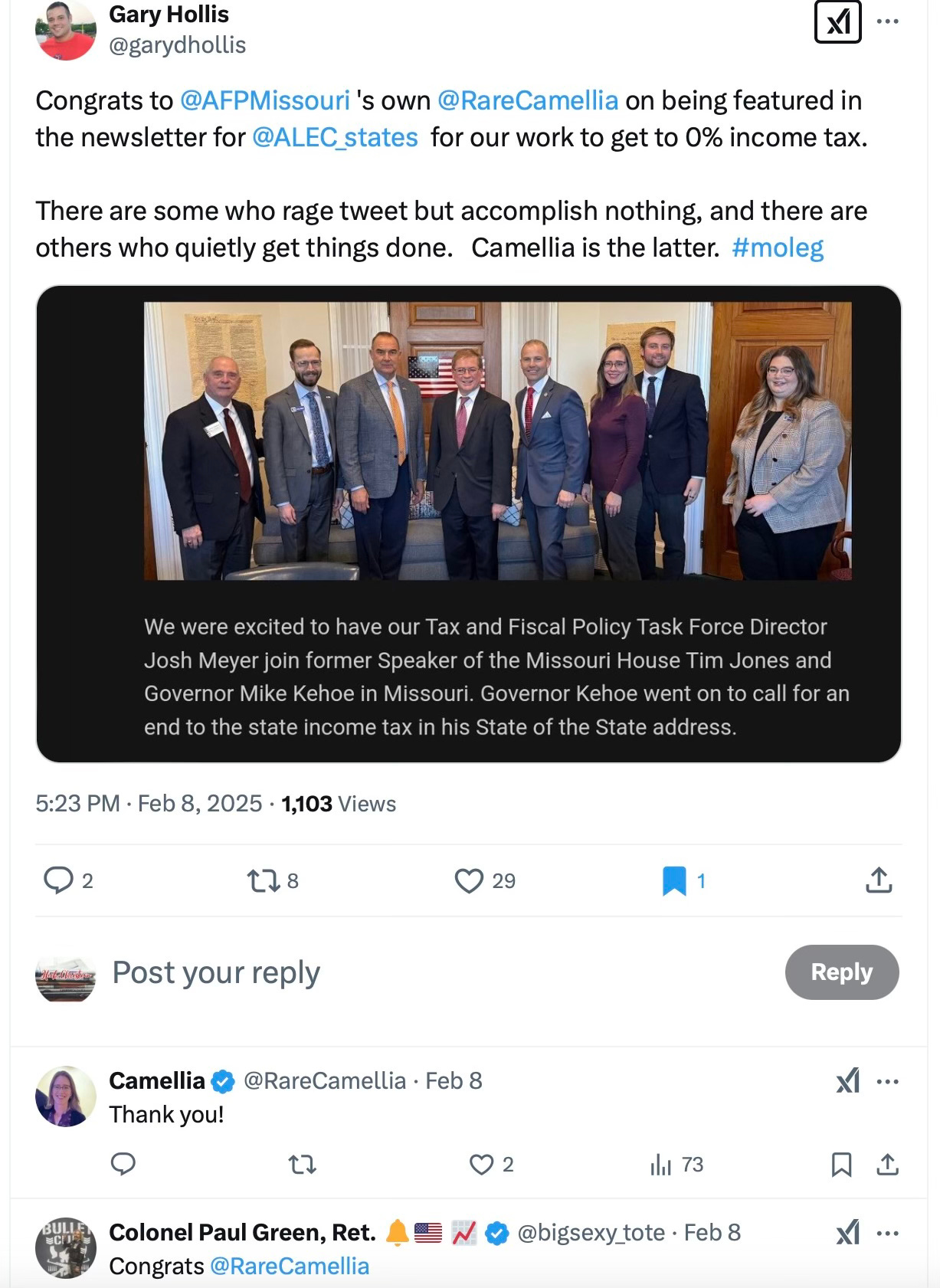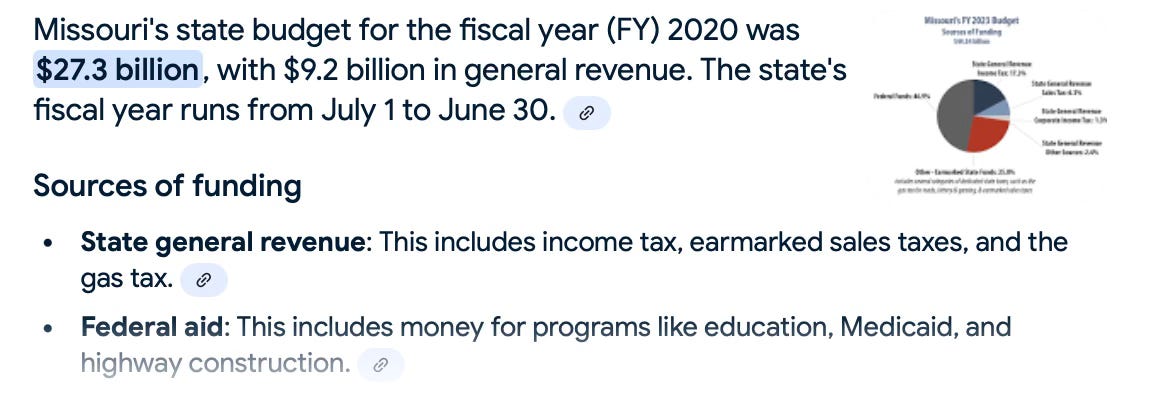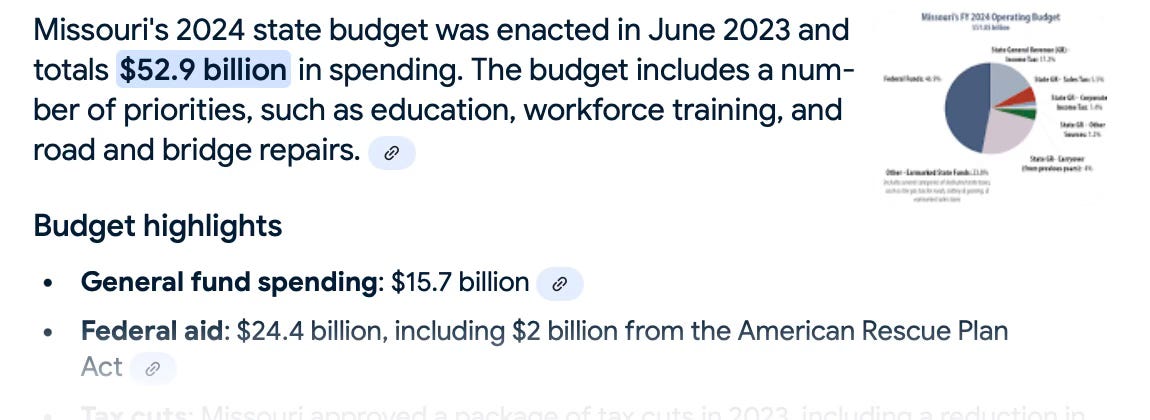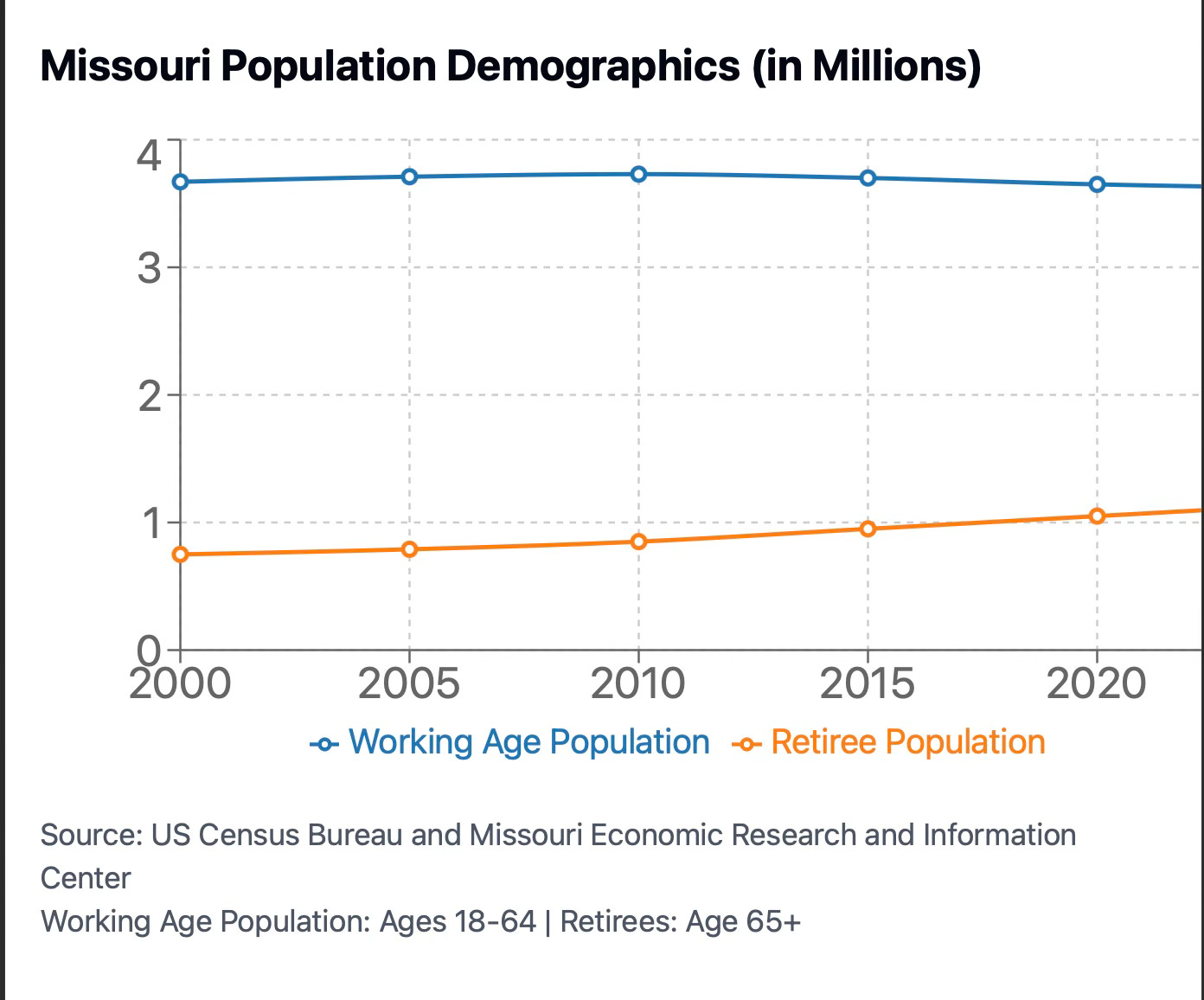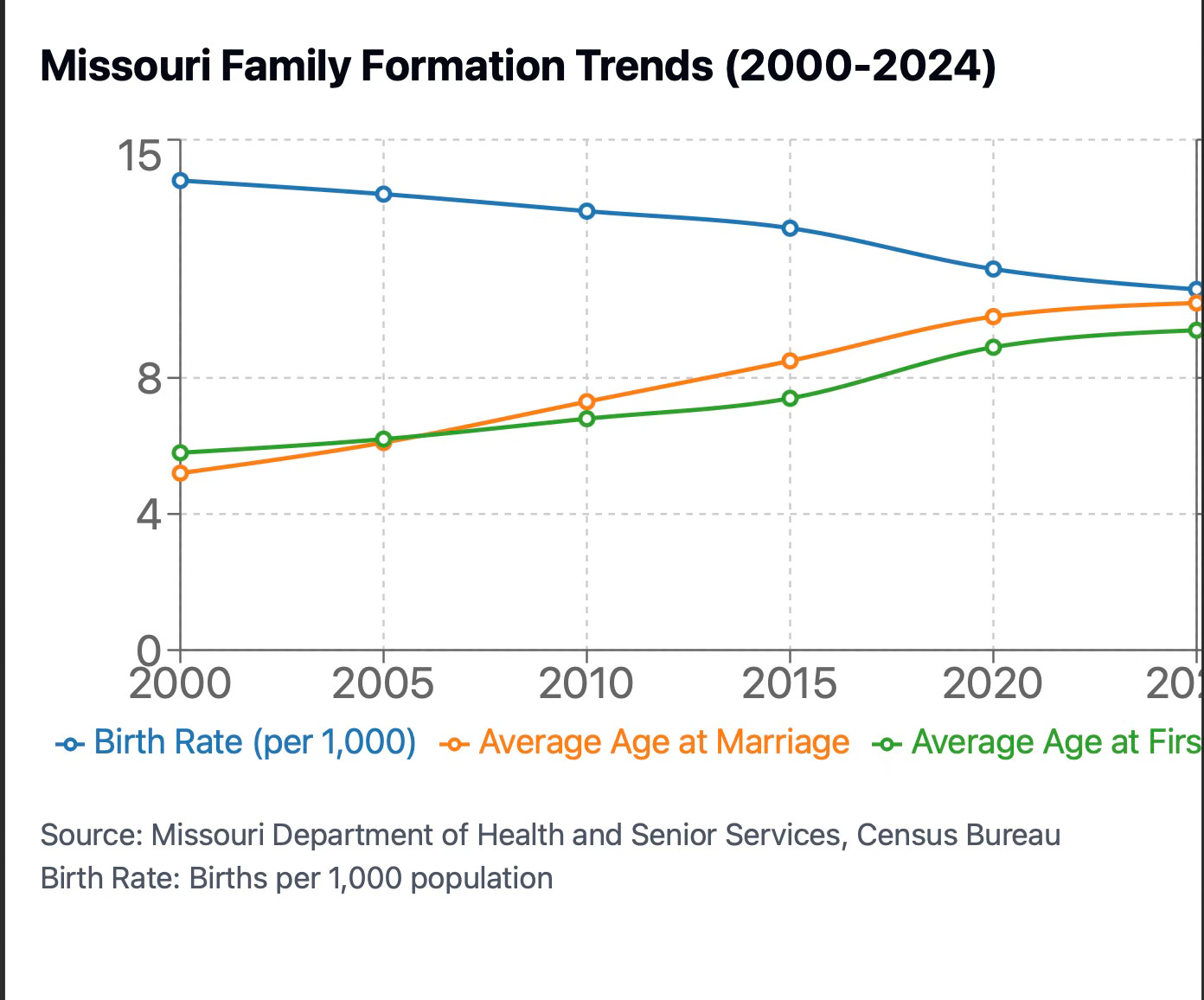Is it even possible to trigger the relief promised by the 0% Income Tax Relief Bill? The math says no. 0% means nothing left untaxed.
By David Rice
Yesterday, I wrote an article exposing the swindle by the Americans for Prosperity (AFP), American Legislative Exchange Council (ALEC), and Governor Mike Kehoe with their new Tax Increase on Missouri families. I shared how State Senator Mike Moon’s alternate Senate Bill 1029 would reduce Corporate Taxes to 0% (which reduces everyone’s costs at the store because taxes belong to the consumer, not corporations).
House Bill 100 and House Joint Resolution 1 both seek to defraud the voters with language that appears to reduce the Income Tax to 0%, but only after a complex series of triggers occurs, guaranteeing that the State continues to receive all of its income, plus it never reduces its spending.
When I ran the numbers on the AFP/ALEC plan to replace Missouri's income tax with their proposed Value Added Tax (VAT), I found the numbers came up short. There doesn’t seem to be a way for the VAT taxes to rise to the amount that would provide relief for the State Income Tax. Even with the most generous assumptions, the math exposes why this plan either can't work or isn't what they claims.
This leads to the inevitable conclusion—this is a swindle, and they are only creating this as a new tax burden because they are afraid they won’t be able to balance the budget if the Federal gravy train disappears.
Current Revenue vs. Proposed Collection
Missouri currently collects $13.35 billion in income tax revenue. To replace this through the proposed 3.775% VAT, let's calculate the maximum possible collection:
Monthly VAT from Average Family:
These are just some small examples of how the State will implement new taxes on your income. They say it’s a 0% Income Tax, but any new tax is an Income Tax. Once the State has decided that tax services are acceptable, local counties and cities will follow suit.
Remember, and this is important, the proposed bill doesn’t replace the current sales tax system already in place. IT ADDS TO IT. This is a new tax, not a replacement tax.
Annual VAT: $2302.75
If, and only if, we based our VAT collection on the best-case scenario where a Median Missouri household purchased large appliances, repaired their home, and bought a new car, they would pay $2302.75 in taxes. While this seems like a good deal, remember that your income taxes are only reduced by 1% if they have a surplus of $120M in reserves first. So, they have to first make all of their revenue.
So, that begs the question, in the best-case scenario for AFP/ALEC, can this tax scheme generate enough money to come up with $13.35B?
Let's go with a more reasonable estimation that every family will spend $75 a month in Value Added Taxes, which seems less at first than the $225 a median family pays on average in State Taxes (that makes around $69K), and do the math. We see that the basic VAT revenue isn’t nearly enough.
Per family: $75.51 × 12 = $906.12
Missouri households: 2.5 million
Maximum annual collection: $2.265 billion
Even Adding Big Purchases:
New car ($30,000): $1,132.50 VAT
Home repairs ($5,000): $188.75 VAT
Appliances ($2,000): $75.50 VAT
Total big purchase VAT: $1,396.75
If every household made these major purchases annually (an absurdly generous assumption), it would add another $3.49 billion.
If we add the best-case scenario where every family makes major purchases like a car yearly (remember they only make $69K annually), we only come up to ~$5.76B. This is far short of the $13.35B needed to make up the current State Income Tax.
Best Case Total: $5.76 billion
They have done the math at the AFP/ALEC, still wrote the bill, and sold it to Davidson and Trent to champion. Though Davidson and Trent probably aren't intelligent enough to read bills given to them, Mike Kehoe is smart enough to know the purpose of this bill. One should not underestimate Kehoe’s intelligence or ruthlessness.
Hidden Utility Costs
Further, the AFP/ALEC plan contains another cost many might miss. The bill removes Missouri State constitutional protections against taxing services, specifically repealing this protection:
"[In order to prohibit an increase in the tax burden on the citizens of Missouri, state and local sales and use taxes (or any similar transaction-based tax) shall not be expanded to impose taxes on any service or transaction that was not subject to sales, use or similar transaction-based tax on January 1, 2015]."
It replaces it with language applying the new 3.775% tax to "all sellers for the privilege of selling tangible personal property or rendering taxable services."
Here's what this means: Without specific exemptions for utilities (which the bill doesn't provide), Missouri families would pay this new 3.775% tax on:
Electric bills
Gas bills
Water/sewer bills
Telecommunications
On any New Future Service that has yet to be Invented
For a family with average utility costs:
$200 monthly electric bill: $7.55 new tax
$100 monthly gas bill: $3.78 new tax
$75 monthly water/sewer: $2.83 new tax
$150 monthly telecom: $5.66 new tax
Total New Monthly Utility Tax: $19.82
This would be in addition to existing utility taxes and fees, adding nearly $240 annually to an average family's utility costs. Services, utilities, and groceries will go up in cost, while the Missouri Budget will also magically increase because of the extra revenue. You grow poorer while the government grows wealthier. Isn’t this why you vote for a Republican Supermajority?
The Gap
As extremely generous as these assumptions are to give them the benefit of the doubt, the VAT would collect less than half of current income tax revenue. This means one of three things must be true:
1. The VAT rate would need to be at least triple the proposed rate
2. They plan to keep both tax systems indefinitely
3. State spending would need to be cut by over $7 billion
Option three seems unlikely since Kehoe has presided over increasing the spending from $27B to $54B as Lt. Governor. One of the things he has not promised on the campaign trail is to cut spending.
This leaves us with a much higher VAT rate or a permanent dual tax system. I expect they will provide us with a dual tax system that our cities and counties will replicate.
What They're Not Telling You
The requirement that the Tax Reform Fund maintain a $120 million balance before any income tax reduction makes more sense now. Even the language is ambiguous. It has to be equal to or greater, which means reaching $120M doesn’t mean an automatic trigger. It could be delayed if they choose not to provide the tax cut to the Income Tax rate. Even generous math shows this VAT can't possibly replace income tax revenue, and it’s hard to believe they don’t know it is limited in its ability to generate its promised results.
This means Missouri families would:
Pay new VAT taxes on everything—everything
Keep paying income tax because revenue targets won't be met
End up with a higher total tax burden
People will develop an underground system to avoid the VAT system, leading to regulations and fines by these managing bureaucrats to take more money from everyone.
Under Mike Moon's plan, Senate Bill 1029, corporate tax reduction directly lowers prices without adding new taxes. The AFP/ALEC plan adds new taxes, making it mathematically impossible to deliver promised relief.
The numbers don't lie. This isn't a tax reduction plan—it's a tax expansion plan disguised as relief. It was like this was written by Joe Biden to give money to the Ukrainian refugees, but then only a fraction of the funds actually provided any relief, and $100B just disappeared.
We should see Kehoe as just another Joe Biden—a career politician only interested in stealing money from you to give to his political allies and government bureaucracies.
We need to eliminate our Income Tax. We need to eliminate our Corporate Taxes. We should minimize any taxes, including property taxes. We have too much Government, which creates this heavy tax burden. We should cut as much of both as possible, eliminating taxes and government to the bare bone. This would Make Missouri Great Again.
These Bills, introduced by Davidson and championed by the grunts like Trent, are designed to swindle voters into thinking they are getting relief from oppressive government overspending but are increasing the taxes and guaranteeing the government can continue to spend at the astronomical rates it is paying.
Follow me on X @HickChristNews
HickChristian is a reader-supported publication. To receive new posts and support our work, consider becoming a free or paid subscriber.




